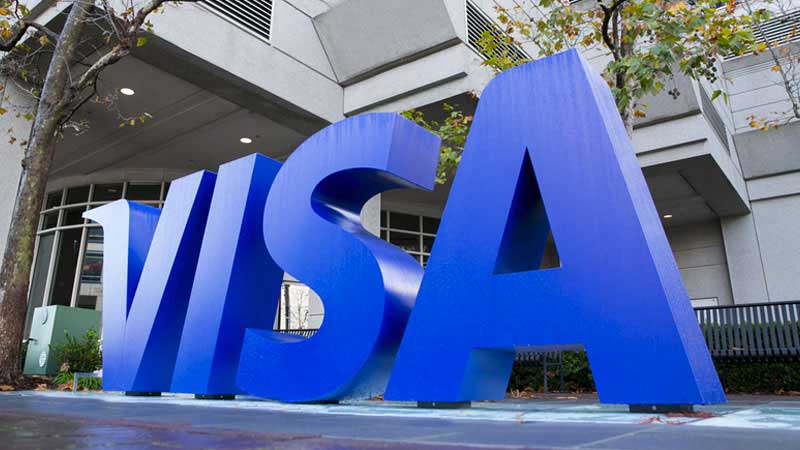
The fintech surge that floated all boats earlier this year has given way to a pullback across the sector, and that includes Visa (Visa Stock Quote, Charts, News, Analysts, Financials NYSE:V), which is now down about 15 per cent since this past summer.
Is Visa now a buying opportunity at these levels? Not likely, says Gordon Reid of Goodreid Investment Counsel, who thinks ongoing disruption in the payments and fintech space is only getting started and companies like Visa may be hard pressed to maintain or grow market share going forward.
“Two years ago, we sold Visa into the market after having owned it for many years. And the reason was that it had grown in valuation from about a market multiple to more than double a market multiple. And today it trades at around 30 times earnings,” said Reid, president and CEO at Goodreid, who spoke on BNN Bloomberg on Thursday.
“It’s a great business, there’s no question, but we have questions about whether there’s going to be dislocation in that business and commoditization,” he said. “Think about it, you use a card, it costs usually the vendor, a couple or three per cent to facilitate the payment through that card [but]with the advent of technology and the fintech revolution, we strongly believe that there are going to be disruptive technologies and they’re already starting.”
Visa’s business has done well over the pandemic, with its payments volume skyrocketing over the past two years. Reporting its fiscal fourth quarter 2021 financials in late October, the company saw Q4 payments volume up 17 per cent from a year earlier but up 121 per cent compared to pre-pandemic numbers for the fiscal fourth quarter 2019.
Visa’s top and bottom line numbers for the fourth quarter came in better than expected at $6.6 billion in revenue, up 29 per cent year-over-year, and net income of $3.5 billion or $1.62 per share. On average, analysts were expecting $1.54 per share.
“Despite the backdrop of a global pandemic, this quarter, we also set a record with total global payments volume of $2.8 trillion. Cross-border volume, excluding intra-Europe, was 86 per cent of 2019, four points better than Q3 and up 46 per cent year-over-year. And processed transactions were 124 per cent of 2019, up four points from Q3 and up 21 per cent year over year,” said Visa CEO Al Kelly in the fourth quarter earnings call on October 27.
Kelly said Visa is well-positioned for growth considering the “enormous opportunity” ahead in the consumer payments space, where the pandemic saw the further digitization of cash and accelerated growth in e-commerce. At the same time Kelly pointed to Visa’s upgraded capabilities, its value-added services and facilitation of cryptocurrency and other fintech companies through its platform are all supporting Visa’s position going forward.
“Fintechs have also fuelled our growth. In the last year, nearly 30 per cent more fintechs issued Visa credentials, and they have more than doubled their payments volume. Furthermore, fintechs are scaling. We’ve also grown acceptance to more than 80 million merchant locations, up 14 per cent year over year,” Kelly said.
“And when you include small businesses behind players like Stripe and Square, the number is north of 100 million merchant locations. We’ve grown tap to pay to 70 per cent of all face-to-face transactions globally. Excluding the United States, we have more than 70 countries with over 50 per cent contactless penetration,” he said.
Earlier this month, Visa announced a new consulting and advisory service to help clients in their cryptocurrency dealings while in October it touted its role in the rise of instalment financing, the ‘Buy Now, Pay Later’ movement that’s made headlines this year. Visa said it has partnerships worldwide with banks and payments companies who have a hand in the BNPL space.
“For years, Visa has been enthusiastically embracing BNPL for the same reason we pioneered revolving credit, debit and prepaid decades ago: because it expands choice and convenience for buyers and sellers alike,” said Mary Kay Bowman, Visa SVP and global head of payment and platform products, in a press release. “If shoppers prefer a BNPL fintech solution, we are here and enabling it; if they want an option from their banks, we’re helping offer those too.”
BNPL was brought into the spotlight earlier this year when Square announced plans to acquire Australian fintech company Afterpay for a whopping $29 billion as other BNPL facilitators like Affirm have seen huge growth in their services. In an effort to compete, PayPal announced this summer a $2.7-billion deal to buy Japanese BNPL company Paidy; meanwhile, PayPal recently reported a 5x rise in BNPL usage over this year’s Black Friday.
But Reid is not convinced that Visa’s strengths fit well with the coming revolution and warns that with the stock at its current levels investors may be courting trouble with Visa.
“We see applications through Square, PayPal, certainly Apple Pay and Google Pay, so there’s competitive action going out there and that’s only going to erode margins,” Reid said.
“And at 30x earnings, we think there’s just a tremendous amount of risk here. So we would pass on Visa,” he said.
Leave a Reply
You must be logged in to post a comment.





 Share
Share Tweet
Tweet Share
Share




Comment